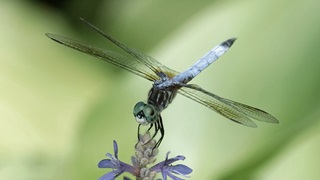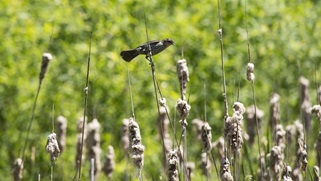Fight to save northern long-eared bat gains altitude
Minnesota's Dovetail Partners helping to protect a valuable, and threatened, species
The fight to save the northern long-eared bat has begun in earnest. And in Minnesota, Dovetail Partners is helping to lead the charge.
Since it was discovered in New York State a decade ago, a fungal disease known as white-nose syndrome has killed millions of bats in the northeastern United States, and central and eastern Canada—a development that is causing havoc on ecosystems that rely on bats for insect control.
“There’s so much about the northern long-eared bat that we are yet to discover,” says Katie Fernholz, executive director of Dovetail Partners, a Minneapolis-based non-profit that uses science to better inform decision-making in the public and private sectors.
“Continued research is critical so that we can learn how to protect this species more effectively.”
Dovetail Partners was the recent recipient of a $50,000 grant from Enbridge’s three-year, $3-million Ecofootprint Grant Program. This funding will help the group perform important research, field surveys and data collection on the northern long-eared bat in Aitkin and Carlton Counties.
The bat was recently listed as a threatened species by the U.S. Fish and Wildlife Service under the Endangered Species Act. White-nose syndrome predominantly affects hibernating bats, and more than half of North America’s 47 bat species are forced to hibernate for winter survival.
Fernholz says the Ecofootprint grant will fund research to better understand the long-eared bat’s habitat, population density and any threats it faces. White-nose syndrome has spread to Minnesota and other states in the bat’s range.
“The survey work we conducted last year indicated healthy bat populations in Aitkin and Carlton County, so the Enbridge grant will help us replicate the work this year and next to see whether that continues to be the case,” says Fernholz.
“Enbridge’s original scientific survey of the northern long-eared bat in Minnesota was pioneering research that helped create the foundation for additional analysis.”
Dovetail Partners will be conducting survey work at the Long Lake Conservation Center, an environmental learning center in Aitkin County, to serve as educational support for students, teachers, and natural resource professionals.
“The educational work we do is as crucial as the research, in terms of helping people understand the importance of bats to the life of a forest and to the environment as a whole,” Fernholz notes.
Dovetail will share its research findings, and continue to collaborate with a range of bat experts, including:
- U.S. Fish and Wildlife;
- the U.S. Forest Service;
- Minnesota’s Department of Natural Resources; and
- local land managers from Aitkin and Carlton Counties, who have offered access to land in those regions as research sites.
Launched in the spring of 2015, Enbridge’s Ecofootprint Grant Program will provide $3 million over the next three years to communities in Minnesota, North Dakota, and Wisconsin along the Sandpiper Pipeline and Line 3 Replacement project routes.
“Dovetail Partners’ scientific research and educational programs are important efforts that are making a difference in the community,” says Cindy Finch, a Minnesota-based senior public affairs advisor with Enbridge.
“It’s exactly the kind of local, community-oriented approach that the Ecofootprint Grant Program was designed to make possible.”









